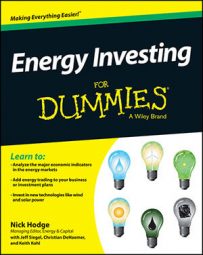The following are among the top-ranked exchange-traded funds (ETFs) available, using a combination of ratings from multiple agencies. The expense ratios associated with ETFs included in the list of oil and gas sector ETFs are much lower than those associated with mutual funds.
Name: Energy Select Sector SPDR Fund
Ticker: XLE
Fund start date: December 16, 1999
Category: Equity Energy
Total assets: $8 billion
Expense ratio: 0.18%
Dividend/annual yield: $1.30/1.65%
Top five holdings: ExxonMobil Corporation, Chevron Corp., Schlumberger, Occidental Petroleum, ConocoPhillips
Description: This investment seeks to provide investment results that, before expenses, correspond generally to the price and yield performance of publicly traded equity securities of companies in the Energy Select Sector Index. In seeking to track the performance of the index, the fund employs a replication strategy. It generally invests substantially all, but at least 95 percent, of its assets in the securities comprising the index.
The index includes companies from the following industries: oil, gas and consumable fuels, and energy equipment and services.
Name: Vanguard Energy Index Fund
Ticker: VDE
Fund start date: September 23, 2004
Category: Equity Energy
Total assets: $3 billion
Expense ratio: 0.14%
Dividend/annual yield: $1.99/1.78%
Top five holdings: ExxonMobil Corporation, Chevron, Schlumberger, ConocoPhillips, Occidental Petroleum
Description: This investment seeks to track the performance of a benchmark index. The fund employs an indexing investment approach designed to track the performance of the MSCI U.S. Investable Market Index (MI)/Energy 25/50, an index made up of stocks of large, mid-size, and small U.S. companies within the energy sector, as classified under the Global Industry Classification Standard (GICS).
It attempts to replicate the target index by investing all, or substantially all, of its assets in the stocks that make up the index, holding each stock in approximately the same proportion as its weighting in the index.
Name: Market Vectors Oil Services ETF
Ticker: OIH
Fund start date: December 20, 2011
Category: Energy Equity
Total assets: $2 billion
Expense ratio: 0.46%
Dividend/annual yield: $0.40/0.94%
Top five holdings: Schlumberger, Halliburton, National Oilwell Varco, Transocean Ltd., Baker Hughes Inc.
Description: The investment seeks to replicate as closely as possible, before fees and expenses, the price and yield performance of the Market Vectors U.S. Listed Oil Services 25 Index. The fund normally invests at least 80 percent of its total assets in securities that make up the fund’s benchmark index. Its benchmark index is composed of common stocks and depositary receipts of U.S. exchange-listed companies in the oil services sector.
Name: iShares Dow Jones U.S. Energy Sector Index Fund
Ticker: IYE
Fund start date: June 12, 2000
Category: Equity Energy
Total assets: $1 billion
Expense ratio: 0.47%
Dividend/annual yield: $0.68/1.52%
Top five holdings: ExxonMobil Corporation, Chevron Corp., Schlumberger, ConocoPhillips, Occidental Petroleum
Description: The investment seeks investment results that correspond generally to the price and yield performance, before fees and expenses, of the Dow Jones U.S. Oil & Gas Index. The fund generally invests at least 90 percent of its assets in securities of the underlying index and in depositary receipts representing securities of the underlying index.
The underlying index measures the performance of the oil and gas sector of the U.S. equity market. The underlying index includes companies in the following industry groups: oil and gas producers and oil equipment, services, and distribution.
Name: iShares S&P Global Energy Sector Index Fund
Ticker: IXC
Fund start date: November 12, 2001
Category: Equity Energy
Total assets: $1 billion
Expense ratio: 0.48%
Dividend/annual yield: $0.97/2.41%
Top five holdings: ExxonMobil Corporation, Chevron Corp., BP PLC, Royal Dutch Shell, Total SA
Description: This investment seeks investment results that correspond generally to the price and yield performance, before fees and expenses, of the S&P Global 1200 Energy Sector IndexTM. The fund generally invests at least 90 percent of its assets in the securities of the underlying index and in depositary receipts representing securities of the underlying index.
The underlying index measures the performance of companies that Standard & Poor’s Financial Services LLC, a subsidiary of the McGraw-Hill Companies, deems to be part of the energy sector of the economy and the S&P believes are important to global markets.
Name: SPDR S&P Oil & Gas Exploration & Production ETF
Ticker: XOP
Fund start date: June 19, 2006
Category: Energy Equity
Total assets: $912 million
Expense ratio: 0.35%
Dividend/annual yield: $0.65/1.05%
Top five holdings: PDC Energy Inc., Delek U.S. Holdings Inc., Berry Petroleum, Valero Energy Corporation, Cabot Oil and Gas Corporation
Description: The investment seeks to provide investment results that, before fees and expenses, correspond generally to the total return performance of an index derived from the oil and gas exploration and production segment of a U.S. total market composite index. The fund employs a replication strategy in seeking to track the performance of the S&P Oil & Gas Exploration & Production Select Industry Index.
It generally invests substantially all, but at least 80 percent, of total assets in the securities comprising the index. The fund may invest in equity securities that aren’t included in the index, cash and cash equivalents, or money market instruments.

